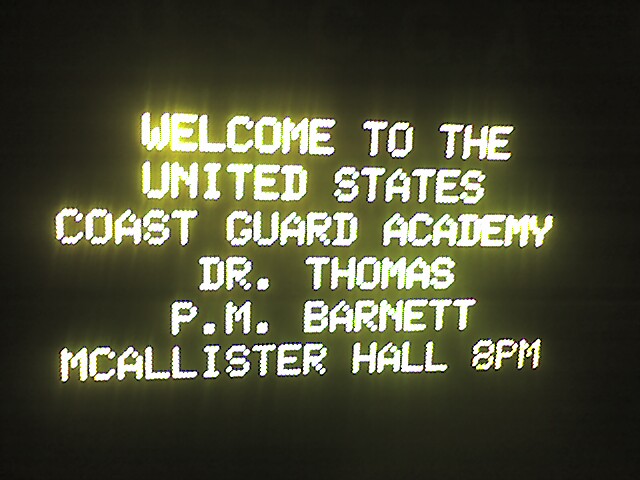Now is the time for all good economists to come to the aid of the military-market nexus
 Friday, January 27, 2006 at 6:07PM
Friday, January 27, 2006 at 6:07PM ARTICLE: “U.S. Rebuilding in Iraq Found to Fall Short: Agency Blames Security Costs, Poor Planning and Priority Shifts; Of 136 water and sanitation projects planned, only 49 will be done, a study says,” by James Glanz, New York Times, 27 January 2006, p. A10.
ARTICLE: “Study Says 80% of New Orleans Blacks May Not Return: A university report poses a continuing question: ‘Whose city will be rebuilt?’” by James Dao, New York Times, 27 January 2006, p. A16.
ARTICLE: “’No one knew how to deal with it,’” by Anne Rochell Konigsmark, USA Today, 27 January 2006, p. 4A.
CHART: “Nations’ needs after tsunami: Estimated cost for long-term recovery in tsunami-hit areas (in billions),” by David Stuckey and Dave Merrill, USA Today, 27 January 2006, p. 1A.
ARTICLE: “Students Are Leaving the Politics Out of Economics: Shunning Advocacy To Focus on Science,” by Louis Uchitelle, New York Times, 27 January 2006, p. C3.
OP-ED: “Axis of Evo,” by Mary Anastasia O’Grady, Wall Street Journal, 27 January 2006, p. A9.
COLUMN: “Win-Win? Tell It To the Losers,” by Floyd Norris, New York Times, 27 January 2006, p. C1.
Get used to a steady stream of official US Government reports on how we mangled Iraq’s rebuilding. The key dynamic was this: we didn’t secure Iraq adequately, and the decision to keep Shiites and Kurds on board by disbanding the Sunni-dominated army meant that this combined need to backfill on security while training up an entirely new force essentially diverted the bulk of the reconstruction spending into security spending.
The inspector general’s report cited here speaks of a “reconstruction gap,” defining it as the difference between what we promised to spend on the reconstruction and what we’ll actually end up spending. Consider it a penalty tax for not having an adequate SysAdmin force, one that the Iraqi people will end up paying for decades.
But FEMA’s “reconstruction gap” in New Orleans is probably just as big. Like the Defense Department, FEMA has no budget for actual operations, so it lives on emergency spending which creates the similar sort of jumping-through-your-asshole bureaucratic responses (“No one knew how to deal with it”) as that witnessed within DoD in Iraq on the postwar planning and operations. The tax in this instance will be a traveling one, as in all the blacks and underclass in general who will never return to the Big Easy because their version of it will likely never return. A harsh outcome for a roguish state. Still, LA never reached for WMD, so you’d think it would deserve better.
One can count up the reconstruction gap in South Asia as well. In Sri Lanka, India and Indonesia alone the combined long-term cost is estimated at just under $10 billion. Go back and do the math and I think you find the world came nowhere near that amount. But can we expect such an outpouring of public funds, or do we need to rethink how the public sector encourages the private sector to enter these postwar/postdisaster/postwhatever situations as early as possible instead of staying away?
Indonesia’s new president, a former general no less, seems to have done a decent job of this sort of thing, both on the public sector side (limited corruption) and on the private sector side (tapping business consultants to lure private sector investments in, on the advice of Singapore’s elder sage, Lee Kwan Yew).
Amazingly, in this last year of unprecedented postwar reconstruction efforts and unprecedented postdisaster reconstruction efforts, I don’t think I’ve read a single bold article on the economics of either.
Instead, we are all enthralled with “Freakonomics,” a good book whose reach is both profound (the abortion question on crime) and pendantic (don’t even get me started). And it’s this book that is apparently striking the nerve of young economics students across America: they want to be statisticians now, not policy makers. They want to eschew politics, and instead keep clean from such messy entanglements and such unnecessary ambitions.
Too bad. Because we need such ambition from the dismal science now more than ever. Think of America and the global economy without an Alan Greenspan, of a Paul Volcker before him. We need such giants, whether they have degrees or not, because plumbing the complex depths of the military-market nexus may prove to be the defining element of any long-term win in the global war on terrorism.
Because, remember, the only exit strategy that really works entails job creation. Peace is the ultimate aftermarket.
We get leftist swings in the Andean (not “Indian”) portions of Latin America because many ordinary citizens there see real activism and a regaining of personal control in the politics of populism. It’s an illusion and a dangerous detour, policy-wise, and yet it meets people’s emotional needs. Better to feel like Evo Morales or Hugo Chavez somehow controls the country’s destiny on behalf of the people than deal with the reality that globalization rules over everybody’s economy—whether they realize it or not.
We can’t win the GWOT by getting smarter only on the military side of that nexus. No sir, it just won’t do.











